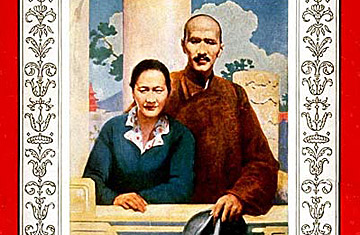
Generalissimo and Madame Chiang Kai-shek
(4 of 8)
Every headline reader knows that in 1937 the Japanese War Machine was halted at Shanghai for 13 long weeks, its timetable shattered by the first Chinese War Machine worthy of the name which the modern world had ever seen. No fault of Generalissimo Chiang was it that he was forced to use his War Machine at least two years before it was finished. His hand was forced by overzealous Chinese patriots, by canny Japanese who believed that unless they beat China in 1937 they might never do so. Today Generalissimo & Mme Chiang have not conceded China's defeat, they long ago announced that their program for as many years as necessary will be to harass, exhaust and eventually ruin Japan by guerrilla warfare. If Generalissimo Chiang can achieve it, he may emerge Asia's Man of the Century. Such success is highly problematical. Meantime, he and Mme Chiang have made themselves Man & Wife of 1937.
Miss Mao. Thirty-six years ago in the village of Chikow lived an indomitable woman. She had a 15-year-old son, Chiang Kaishek, who had the reputation of a wastrel and under her thumb, according to custom, she had Chiang's bride, a Fenghua maiden named Miss Mao. The bride lived to see her husband become great, to be discarded as his wife, to go back to her village and live on a pension of $3,000 Mex per month. His mother lived to contrive, by dint of much scrimping, to stake young Chiang to four years of military schooling in Japan. She died prosperous in 1921, thanks to her dutiful son, who bought her a fine funeral, later built a Buddhist monastery in her memory. Greatest of all was the reward of the village, to which the General has long sent a gift of $40,000 Mex each month.
When Student Chiang arrived in Tokyo, it was, as Moscow later became, a centre of Chinese revolutionary activity. Thus when Chiang Kai-shek returned to China he drifted gradually into the military entourage of Dr. Sun Yatsen, "Father of the Chinese Republic." The young officer was about as close to Sun at the time as Stalin was to Lenin—a loyal subordinate but one of many. From Moscow there arrived in Canton in 1924 the great Propagandist Michael Borodin and the able Soviet General Galen. These men in the closing years of Dr. Sun's life assisted and directed his disciples, and the greatest of these in the military sphere became General Chiang Kaishek.
Conqueror. When the revolutionary army of the Kuomintang ("National People's Party"), founded by Dr. Sun, sallied forth under General Chiang from Canton (TIME, Sept. 20, 1926, et ante), the capital of the weak Chinese Republic was Peking in the north, but middle China was then dominated by famed "Scholar War Lord" Marshal Wu Pei-fu. Ahead of Chiang's army marched a horde of Borodin-coached Chinese, preaching Communist-style propaganda in the name of the Kuomintang. With him marched competent Soviet military advisers and in his ammunition train he carried, beside cartridges, many "silver bullets" with which he bought off local officials who opposed him.
